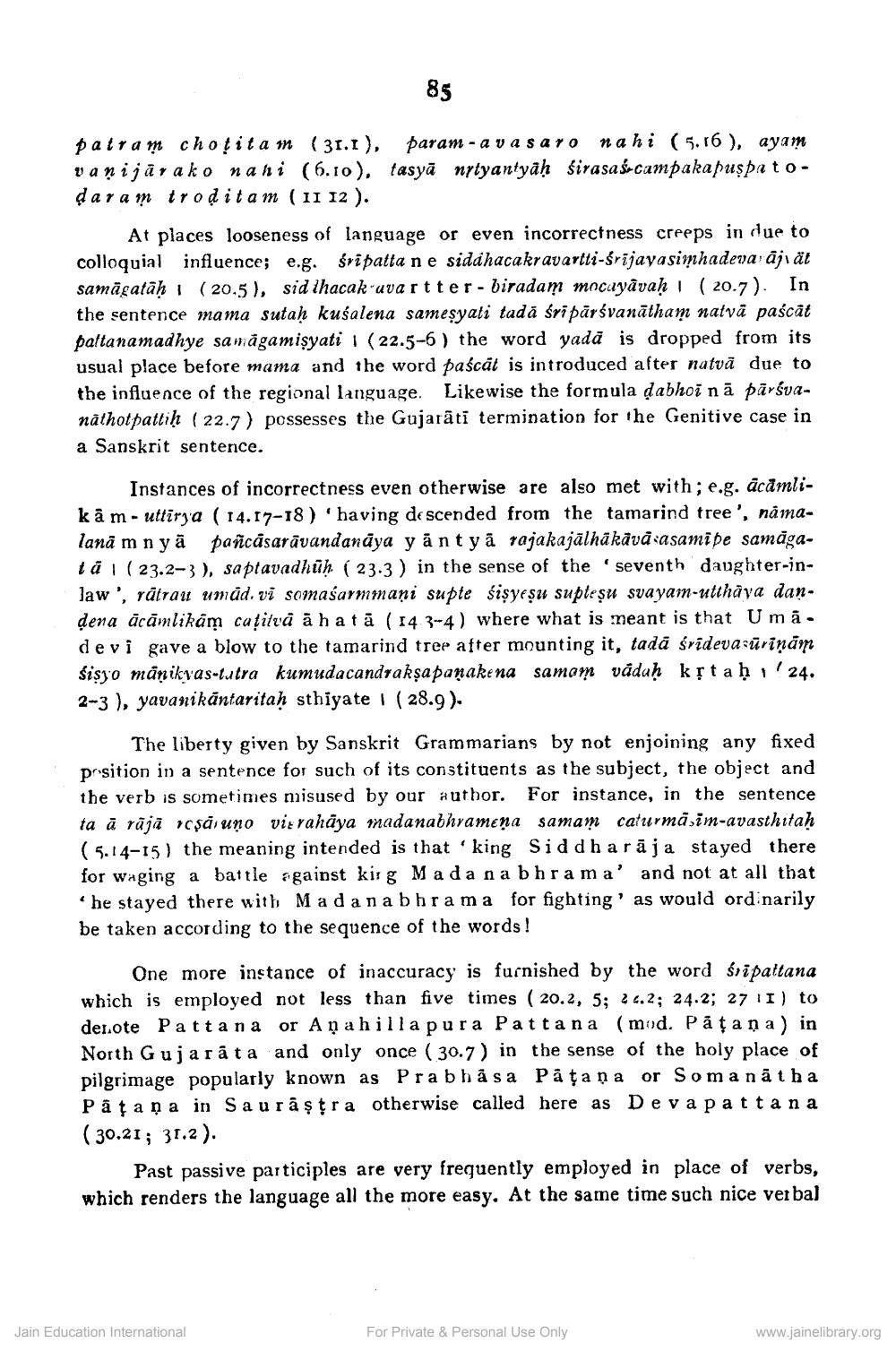________________
85
patram choţit a m (31.1), param - a vasaro nahi (5.16), ayam vanijā, ako nani (6.10 ). tasyā nytyantyāḥ śirasaś campakapuspatodar am trodita m ( 11 12 ).
At places looseness of language or even incorrectness creeps in due to colloquial influence; e.g. sripatta ne siddhacakravartti-srijayasimhadeva aji åt samägatahi (2015), sid lhacak uvartter - biradam mocayāvah ( 20.7). In the sentence mama sutah kuśalena samesyati tadā śrīpārsvanātham natvā paścât paltanamadhye samagamisyati 1 (22.5-6) the word yadā is dropped from its usual place before mama and the word paścät is introduced after natvā due to the influence of the regional language. Likewise the formula dabhoi nā pārsvanăthotpattih ( 22.7) possesses the Gujarati termination for the Genitive case in a Sanskrit sentence.
Instances of incorrectness even otherwise are also met with; e.g. ācāmlikām- uttīrja ( 14.17-18)'having descended from the tamarind tree', namalanā mnyā pañcasarāvandanāya y antyä rajakajālhākāvā asamipe samăgatai ( 23.2-3), saptavadhūh ( 23.3) in the sense of the seventh daughter-inlaw', rätrau umåd. vi somaśarmmani supte śişyesu suplesu svayam-utthaya dan. dena ācāmlikām cațitvå å hatā (14 3-4) where what is meant is that U mã. devi gave a blow to the tamarind tree after mounting it, tadā srideva sūriņām sisjo mānikvas-tutra kumudacandrakṣapanake na samom våduḥ kṣt aḥ, '24. 2-3 ), yavanikāntaritah sthiyate 1 ( 28.9).
The liberty given by Sanskrit Grammarians by not enjoining any fixed prisition in a sentence for such of its constituents as the subject, the object and the verb is sometimes misused by our author. For instance, in the sentence ta ā rājā rcsás uno vix rahāya madanabhramena samam caturmăim-avasthitah (5.14-15) the meaning intended is that 'king Siddharāja stayed there for waging a battle against kirg Mada na bhrama' and not at all that ' he stayed there with Madanabhrama for fighting' as would ord narily be taken according to the sequence of the words!
One more instance of inaccuracy is furnished by the word śripattana which is employed not less than five times (20.2, 5; 24.2; 24.2; 27 II) to denote Patta na or Aņ a hilla pura Pattana (mod. Păţaņa) in North Gujarata and only once ( 30.7) in the sense of the holy place of pilgrimage popularly known as Prabhāsa På ţa na or Soma na tha Pat a ņa in Sa u raş ţra otherwise called here as Deva pattana ( 30.21; 31.2).
Past passive participles are very frequently employed in place of verbs, which renders the language all the more easy. At the same time such nice verbal
Jain Education International
For Private & Personal Use Only
www.jainelibrary.org




